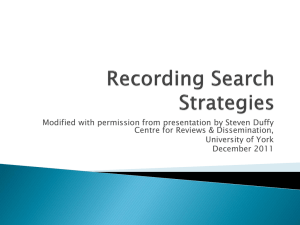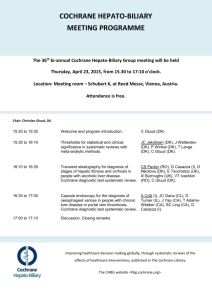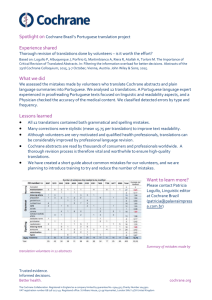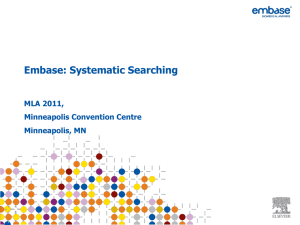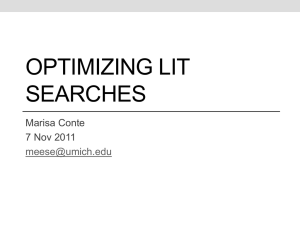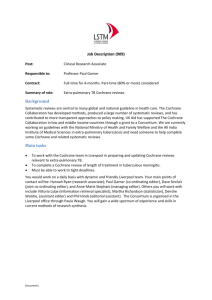Request for Proposals (RFP)
advertisement
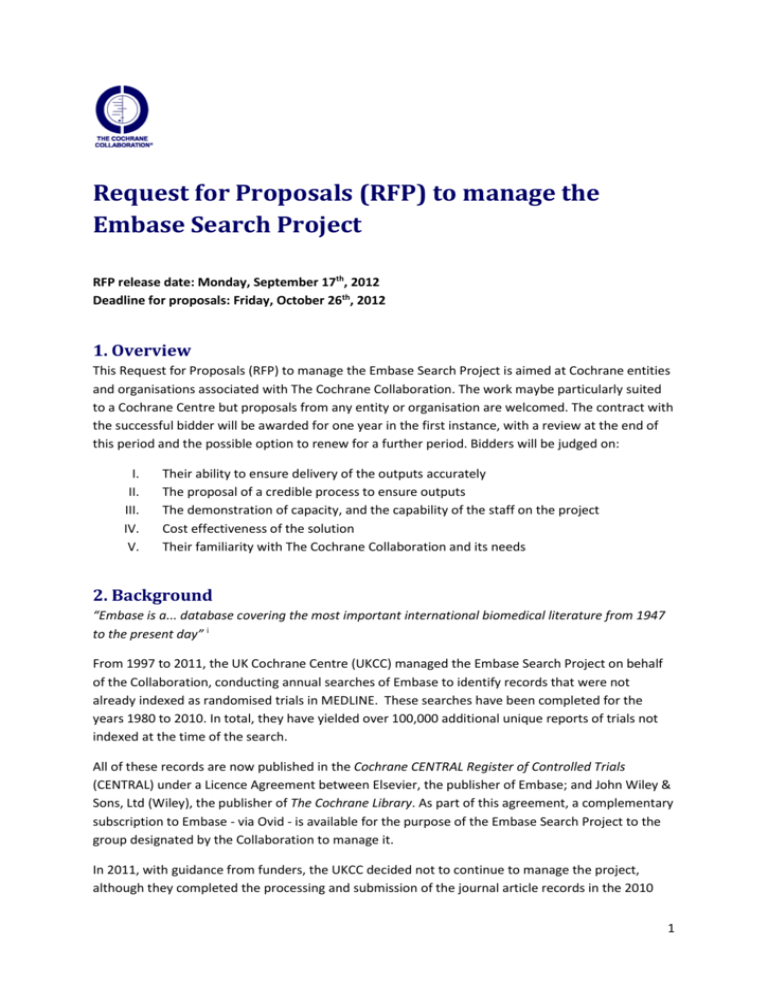
Request for Proposals (RFP) to manage the Embase Search Project RFP release date: Monday, September 17th, 2012 Deadline for proposals: Friday, October 26th, 2012 1. Overview This Request for Proposals (RFP) to manage the Embase Search Project is aimed at Cochrane entities and organisations associated with The Cochrane Collaboration. The work maybe particularly suited to a Cochrane Centre but proposals from any entity or organisation are welcomed. The contract with the successful bidder will be awarded for one year in the first instance, with a review at the end of this period and the possible option to renew for a further period. Bidders will be judged on: I. II. III. IV. V. Their ability to ensure delivery of the outputs accurately The proposal of a credible process to ensure outputs The demonstration of capacity, and the capability of the staff on the project Cost effectiveness of the solution Their familiarity with The Cochrane Collaboration and its needs 2. Background “Embase is a... database covering the most important international biomedical literature from 1947 to the present day” i From 1997 to 2011, the UK Cochrane Centre (UKCC) managed the Embase Search Project on behalf of the Collaboration, conducting annual searches of Embase to identify records that were not already indexed as randomised trials in MEDLINE. These searches have been completed for the years 1980 to 2010. In total, they have yielded over 100,000 additional unique reports of trials not indexed at the time of the search. All of these records are now published in the Cochrane CENTRAL Register of Controlled Trials (CENTRAL) under a Licence Agreement between Elsevier, the publisher of Embase; and John Wiley & Sons, Ltd (Wiley), the publisher of The Cochrane Library. As part of this agreement, a complementary subscription to Embase - via Ovid - is available for the purpose of the Embase Search Project to the group designated by the Collaboration to manage it. In 2011, with guidance from funders, the UKCC decided not to continue to manage the project, although they completed the processing and submission of the journal article records in the 2010 1 dataset. For the first time conference abstracts were included, which Elsevier had newly added to Embase in 2010, increasing considerably the number of records retrieved. For the 2010 dataset, approximately 42,000 potentially eligible records were retrieved, when ordinarily this would have been expected to be around 23,000 to 24,000. A pilot study, looking at approximately 4000 of these records was undertaken to investigate how many might be eligible for inclusion in CENTRAL. Some of these records were processed by the UKCC before work on Embase ceased. 3. Instructions to bidders 3.1. Proposals Proposals are encouraged from bidders that meet the solution outlined in this paper, as it represents the Collaboration’s view of its requirements based on current practices. Other innovative or alternative solutions may also be proposed that will achieve the ultimate aim of the user requirements outlined in the Summary of business needs. Alternative solutions must have sufficient detail to enable comparison. Value-for-money will be a key consideration. 3.2. Tender response Proposals should be provided as attachments to an email to Ruth Foxlee, Information Specialist, The Cochrane Editorial Unit: rfoxlee@cochrane.org. 3.3. Summary of business needs Since 1997, the Embase Search Project has been fundamental to the composition of CENTRAL, which is a key component of the evidence base on which Cochrane and many other systematic Reviews are built. The implementation of the Cochrane Register of Studies (CRS), the Collaboration’s online software for managing specialized registers of healthcare studies and their reports, has resulted in a change in the publication cycle of CENTRAL. In January 2012, CENTRAL moved from a quarterly to monthly publication cycle via the CRS. This cycle includes monthly searches of MEDLINE, which are being carried out by the Collaboration’s development partner for the CRS, Metaxis Ltd. The ability to establish an accelerated process for identifying and processing Embase records will be important consideration in assessing bidders’ proposals. The additional work involved in shifting to a monthly publication cycle has been accounted for in the indicative budget (see item 3.6). In the 2011 for the first time, the entire Medline dataset was included within the Embase dataset. The proposal of a method to handle this change will be considered an essential component of any proposal. In their proposals, bidders should set-out how they intend to provide the following services: 2 I. II. III. IV. V. The identification of reports of randomized controlled trials (RCTs) and quasirandomized controlled trials (QRCTs) in Embase that have not already been indexed with the Publication Types “Randomized Controlled Trial” and “Controlled Clinical Trial” in Medline, from 2011 onwards. Processing of the remainder of the 2010 dataset, comprising conference abstracts only, which was not completed at the time the UKCC ceased to carry out this work. Timely delivery of the records in tagged text format on a monthly basis to Metaxis Ltd. This will be on a monthly cycle for the foreseeable future but the successful solution should also have the capability of delivering records on a ‘publish when ready’ basis. Processing of the 2011 and 2012 datasets (including conference abstracts) to bring the project up to date. This “catch-up” processing must feed into the monthly publication cycle. Annual reassessment of the search strategy to identify relevant studies to take into account changes in indexing terms and enhancements to database content, structure and functionality, and adjustments to the design of the strategy required to ensure trial identification remains methodologically sound. 3.4. Operational requirements The successful bidder will be responsible for: Designing (including annual reassessment) and running searches Developing and updating configuration files Downloading, preparing and distributing records to a handsearcher(s) (for the coding of reports as RCT or Quasi-RCT or not eligible) Recruitment of appropriately skilled handsearchers Quality control of handsearching (for verification of coding) Creating and submitting eligible records to Metaxis Ltd (CRS) for publication in CENTRAL Supporting colleagues from Wiley in the negotiation of contracts with Elsevier 3.5. Project plan Bidders should provide a detailed outline of how they intend to achieve the requirements outlined above. The project plan should include: Information about the search methods the bidder intends to use, shown in enough detail to allow the Collaboration to assess whether or not the project proposal is underpinned by an appropriate level of search methodological expertise Names and summaries of the relevant experience of the staff to be employed on the project Details of the bidder’s relevant experience in the delivery of similar solutions to that outlined by this RFP 3 A template for completing responses is provided at the bottom of this document. 3.6. Project budget The Cochrane Collaboration Steering Group has approved a budget for three years for this project. The indicative funding amount is 30K GBP for the first year with a further indicative budget of 14K GBP for the second and third years. The successful proposal will provide a cost effective solution which meets the Collaboration’s need for identifying unique reports of trials in Embase and delivering them to Metaxis Ltd for publication in CENTRAL. It is envisaged that the majority of the budget will be allocated to staffing costs, though a proportion of the budget may relate to equipment. Travel costs will not be funded. Bidders will provide full costings for their proposals, including the cost of processing the backlog of 2010 Embase conference abstract records (approximately 20,000 records) and the ongoing annual costs of processing Embase records for journal articles and conference abstracts (approximately 42,000 records). It is likely that bidders who bring forward additional resources to part-fund their proposals may be received more positively, but the quality of the proposal will be of paramount importance. Any staff employed as part of the project would be employed by the bidder and not by The Cochrane Collaboration 3.7. Financial and contract considerations The following considerations apply to this RFP: a) The successful bidder will be awarded a contract with The Cochrane Collaboration. Award of the project will not be considered finalised until contracts have been successfully agreed and signed. b) In line with Collaboration policy, and those of other charities, for proposals originating in universities and similar institutions, only direct costs (the marginal costs of delivering the project) will be funded. Indirect institutional and related costs such as ‘estates’ and ‘overheads’ will not be funded. c) For proposals originating in Cochrane entities, entity infrastructure costs will not be funded, except as required for direct delivery of the proposal. 3.8. Bidder profile The bidder should be able to demonstrate experience in the delivery of similar solutions to those outlined in this RFP or that they have appropriately skilled staff who are capable of developing and delivering a solution that meets the Collaboration’s needs. 4 3.9. Handover from UK Cochrane Centre The UKCC can provide the bidder with a set of search terms used in their Embase search strategy to date. These terms have been objectively derived based on the methods used to revise the Cochrane Highly Sensitive Search Strategy for Medline; however recent changes to Embase and the Ovid platform will require that the search strategy itself be adapted before running the 2011 dataset. As noted above, Embase now includes the whole of the Medline dataset; it will be the responsibility of the bidder to devise a method of retrieving reports of RCTs and CCTs that are unique to Embase and not also labelled as RCTs and CCTs as publication types in Medline. As outlined above, selected conference proceedings are now indexed in Embase, which has added considerably to the number of records retrieved. The conference abstracts downloaded in the 2010 dataset by the UKCC and not yet processed as part of the pilot study can be passed on, but the bidder may prefer to run a fresh search to identify records of reports of RCTs or CCTs that are labelled as conference abstracts in Embase to take advantage of any changes in indexing and improvements in formatting of these records since the original search was run in January 2011. The successful bidder will have an opportunity to discuss the issues around conference abstracts in Embase with UKCC staff. 3.10. Statement of Timescales Bidder Response to RFP Bidders’ responses must be delivered to The Cochrane Collaboration (see section 2 b) not later than 00:00 in their location on Friday, 26th October 2012. Consideration of Proposals by The Cochrane Collaboration The Cochrane Collaboration will require a period of time to consider the proposals received. This process should be completed by Friday, 16th November 2012. Clarification During the consideration period the Collaboration will clarify and discuss proposed solutions with bidders as appropriate. Decision The Collaboration hopes to come to a decision within three (3) weeks of the closing date for proposals. Bidders will be judged on the criteria outlined in Section 1. 5 Delivery Schedule Delivery schedules will be agreed between the bidder and the Collaboration, but proposals whose deliverables can be delivered successfully at an early date will be welcomed. 6 TENDER REPONSE FORM EMBASE SEARCH PROJECT Entity/organisation name Entity/organisation contact details Names of the staff on the proposal, including the project lead Contact details for the staff on the proposal Summary of the qualifications and experience of the staff on the proposal Details of the proposal budget 7 Detailed project plan Person authorised to submit the proposal on behalf of entity/organisation Signature: Name: Position in entity/ organisation: In submitting a proposal, the authorised signatory must affirm that they accept the terms and conditions pertaining to the call; and that there is no legal, financial, ethical or other possible conflict of interest, as usually understood or according to The Cochrane Collaboration’s policies, that would prevent their entity/organisation from participating in this call for proposals; or declare such a conflict so that the implications of this can be considered when the proposal is being assessed. i http://www.embase.com/info/what-embase 8
